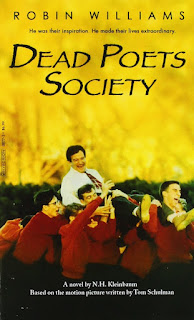Dead Poets Society
This book is a novelised version of the 1989-movie by
the same name. It tells the story of an unconventional English teacher, John
Keating, and a few of his 16-year-old students at Welton Academy Prep School.
The plot is set in 1959 when elite schools followed certain rigid codes very
religiously. Welton (which is Hellton for the students of this novel) is
erected on the “four pillars” of Tradition, Honour, Discipline and Excellence. All
the teachers except Mr Keating belong to the usual conventional rut.
Keating
inspires his students to follow their hearts. Carpe Diem, he tells them, Seize
the day, “… because we’re food for worms, lads!” “Because
we’re only going to experience a limited number of springs, summers, and falls.”
There’s much to be done before our bodies turn cold in their inevitable tombs.
Triumph as
individuals instead of following the herd. That’s one of the things we need to
do, Keating tells his students. As an English teacher, Keating insists on his
students to savour language because “no matter what anyone tells you, words and
ideas have the power to change the world.” Science and other subjects will help
to sustain life. But poetry, romance, and passion – they are what life is essentially
about.
Inspired by
Keating, a group of boys (Welton is a boys’ school) resurrect the Dead Poets
Society which existed as a secret society in Welton when Keating was a student
there. The society is “dedicated to sucking the marrow out of life,” Keating
says using Thoreau’s words. “A small group of us would meet at the old cave,
and we would take turns reading Shelley, Thoreau, Whitman, our own verse – and the
enchantment of the moment let it work its magic on us.”
Get the
maximum out of life. Live life passionately. A group of Keating’s students take
that seriously and the plot moves on to the expected oppositions: from school
as well as parents. There is gnashing of teeth and some tragedy too. And
something more than tragedy too.
I came to know about this book as well as the movie when
Sandra, a grade-12 student of mine, compared me to Keating two days back. Her
comparison raised my curiosity and I borrowed her copy of the novel. As I turned
the pages, I was a little alarmed. Am I really like Mr Keating? All heart and
little brain?
There is
something anti-intellectual about Mr Keating. Conventions – social as well as
academic – ossify you into robotic adherents of given truths. Keating’s
solution is to follow the heart. No wonder, his favourites are the Romantic
poets. He is not interested in critical analyses of poems. He wants students to
savour the passion in the verse.
No, I am not anti-intellectual
though the Romantic worldview occupies a prominent place in my heart with all
its fire of passion. There is something shallow about Keating which I didn’t
like. But this was primarily a movie, I said to myself. A popular movie which
teens loved. The shallowness is understandable. I reasoned. Yet the urge to ask
Sandra what she found in common between the protagonist and me was irresistible.
“Keating is a
really fun teacher so are you,” Sandra texted me promptly. “And the kids in the
book enjoy English classes. Just like him (Keating), u teach us things that lie
beyond the texts… You actually treat us as both students and people in a society.
You’re fun altogether. English classes are so energetic. All of us look forward
to English classes. And I’m sure it’s becoz of the teacher.”
That’s a huge
compliment from a student and I lap it up particularly in these days of the
pandemic which has made classes herculean challenges. But Keating is certainly
not the kind that would be my role model. I hope beyond the fun and the passion,
my classes tickle your grey matter too, dear Sandra.
And one more thing, I love the logo with which you stamp your personal mark on the front page of your books. There’s something in it that the Romantic John Keats would admire.
xZx


Yes sir, Keating is so sucked into the romantic world. He even mocks science.I believe you have an open mind towards reason and facts. But yes, in dealing with us, students, you do have a Keating-vibe.
ReplyDeleteNot just open mind, Sisira, I respect reason and facts. And thanks for letting me know about the vibe :)
DeleteHari OM
ReplyDeleteI understand your student's compliment - though cannot vouch personally for accuracy! As for the story itself, I am rather of a similar view and was at odds with my peers when I said that I felt it somewhat over-rated... YAM xx
Teens see reality differently. They're impressionable, as another character in the novel says.
DeleteAs a student, I kept the belief that language teachers appeal to your romantic side, later on I realized most of my science teachers also, mixing chemicals and showing colors is not rational thinking. Where science teachers fail language teachers can shine as rational thinkers. Kudos to you.
ReplyDeleteAny teacher can exert tremendous influence on students. Science teachers tend to be preoccupied with completing the course material. Language teacher's material is life itself. I received a number of personal messages in response to this post from students who appreciated the way i touched their lives. I'm happy, nay, excited.
DeleteHave not seen the movie, the closest I have to is Mohabaatein :P
ReplyDeleteMany have compared the movie so I am assuming they have taken inspiration from DPS
I wasn't even aware of the movie until this book landed on my table.
Delete